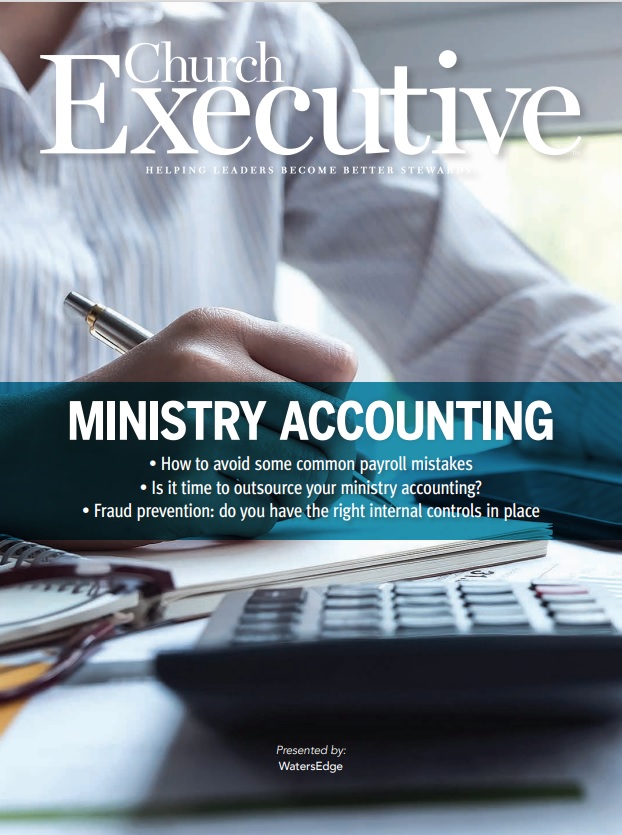
Here’s how to avoid some common payroll mistakes

VP of Ministry Accounting Services
WatersEdge Ministry Services
Church Executive: Why is it important for a church to understand the differences between an employee and a contractor — and what are those differences?
Sarah Barham: It’s important to understand the differences because of the employer’s tax responsibility and reporting requirements. The church will withhold taxes and pay on behalf of an “employee,” but not for a contract worker. As the employer, the church will have expectations for and authority over an employee, and employees are subject to a set work schedule that the church has established. Employees paid any amount of wages receive a W-2 from the church.
An individual who sets his or her own schedule, typically offers their services outside of the church, and provides their own supplies for the work performed at the church, falls under the “contractor” category. Contractors who receive more than $600 in a calendar year receive a 1099 from the church.
But the distinction between employee and contractor isn’t always clear. Things get confusing when, for instance, someone works in the church nursery or fills in as a musician. Technically, they’re using the church’s instruments or coming at a certain time for the church service, which could make them employees. On the other hand, these individuals might also offer their services outside of the church, which means they’d be contractors.
It’s a very fine line, and sometimes the best practice is simply to seek out expert advice to ensure you’re classifying workers correctly.
CE: With regards to state and federal compliance, why does it matter if a minister is licensed/ordained or not?
Barham: Licensing and ordination fall under the church’s responsibility — a church can license or ordain whom it chooses. The reason a church needs to identify if a minister is licensed/ordained (or not) is because the minister can claim a housing allowance which provides tax relief benefits. If a minister elects to designate a portion of his salary as a housing allowance, the church is then restricted from being able to withhold the employer portion of Social Security and Medicare. At WatersEdge, we often see ministerial payrolls being processed in which the church is paying both the housing allowance and taxes, which is not in compliance with IRS regulations.
So, when we process a church’s payroll, we ask for the minister’s certification. If he claims a housing allowance, we designate him as licensed/ordained and therefore exempt from FICA withholding. But a minister also has the option of being designated as a “secular minister,” where he doesn’t claim a housing allowance. Today, most ministers buy their own houses or live off site.
There are other considerations surrounding housing, too. You might be able to claim decorations, utility bills and so on, but it depends on what the church pays for.
CE: What are some examples of overcomplicated deductions?
Barham: There’s a popular deduction that is often referred to as a “social security offset.” If a minister meets the requirements for self-employed status, he will be responsible for paying self-employment taxes. Churches will often deduct that self-employment tax from the payroll and keep those funds for the minister until taxes are due. Then, the church will reimburse the minister just in time for paying those self-employment taxes by the quarterly due date. This can considerably complicate a church’s payroll and the accounting of those deductions and payments.
Another common deduction we see is for cell phones, or that a minister wants tithes paid out of his payroll. They want to give 10 percent to a particular ministry and 10 percent to another, and so on. These types of deductions make church accounting difficult, especially when trying to orchestrate all of this in-house.
CE: Why is it important to verify whether or not a salary package for a new church employee includes benefits?

Barham: It provides clarity for the church and for the minster. If a salary package includes salary, housing, tax offsets, reimbursements for personal expenses, and benefits, then that can reduce a minister’s take-home pay. Let’s say, for example, a church finance committee sets a salary package of $150,000 but doesn’t specify what it includes. (This happens more often than you might think.) Is the $150,000 for wages only, with housing and benefits added on top? Or does the $150,000 include those benefits? If so, the breakdown might look something like this: $80,000 in wages, $50,000 in housing, and $20,000 in benefits. The problem is compounded when this ambiguous figure is reported to payroll (either internally or to outsourced services). Is the new minister’s compensation $150,000 plus these benefits, or does that amount include them? We’ve seen multiple churches fail to make this distinction and realize at the end of the year that they’ve paid out much more than they budgeted for. Ideally, paperwork and documentation are provided for each employee, but often it isn’t laid out in a concise way relative to what the expectation was. Clarity on wages, benefits, reimbursements and deductions can become overwhelming and convoluted.
CE: Why is it so crucial for churches to make state and federal tax payments on time?
Barham: I’ll start by quoting Romans 13:7 — “Pay everyone what you owe him: taxes to whom taxes are due, revenue to whom revenue is due, respect to whom respect is due, honor to whom honor is due.” Fines are an obvious repercussion, but states that collect taxes can also attempt to close a church for violations.
For us at WatersEdge, there’s a stewardship consideration, too. Paying avoidable fines and penalties simply isn’t good stewardship. When a church misses a deadline and pays late, fines are added, and those fines are a non-budgeted expense. The church is then forced to dip into other funds to pay those penalties, as opposed to using those dollars for outreach or other ministry activities.
CE: It sounds like payroll mistakes are pretty common. At what point should a church leader consider outsourcing payroll to a third party?
Barham: If a church isn’t 100-percent confident in its tax withholding and tax reporting practices, then outsourcing makes sense. I’ll say this: the majority of times when we see penalties or fines issued to a church, it’s because that church just didn’t know any better. Unfortunately, the government isn’t very forgiving. Outsourcing to a third party provides accuracy and efficiency. Our goal is to financially empower ministries to change lives with the Gospel. This help frees them to do that.
CE: What should church leaders who are concerned with the cost of outsourcing payroll know?
Barham: Outsourcing payroll provides time, transparency and trust. How valuable is your time when it comes to spending or investing it in the Gospel? And what about transparency? If this is a concern, consider that although you’ll be placing distance between you and payroll, you will retain access to reports and pay history. You’ll be able to share this information with committee members or the church at any time.
Finally, you can rest assured that your church is compliant with federal and state rules and regulations.
CE: Is there anything else we should know about avoiding payroll mistakes?
Barham: Sometimes churches pay employees small amounts of money without running it through payroll. They might write a nursery worker a $20 check, for example, because the church didn’t think it was enough to withhold taxes. But that can become a big compliance problem. Often, deciding what’s taxable and what isn’t is best left to experts.
— Reporting by RaeAnn Slaybaugh


